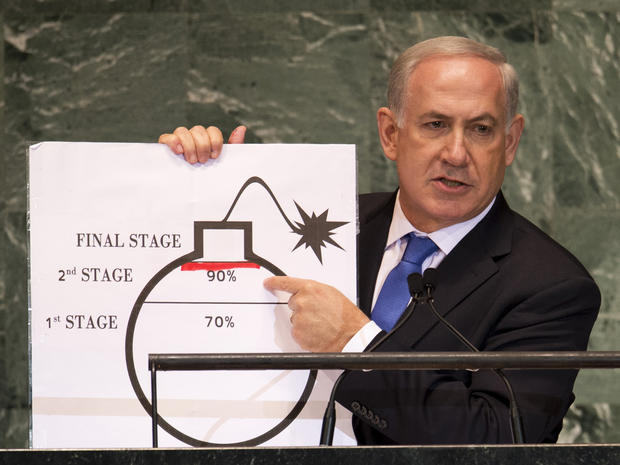Iran nuke deal better than no deal at all?
As the Obama administration continues its all-out effort to sell the Iran nuclear deal to Congress, the Islamic Republic's president said Wednesday that his nation would only sign the final deal if crippling economic sanctions imposed by the international community are dropped on the same day.
"We will not sign any agreement, unless all economic sanctions are totally lifted on the first day of the implementation of the deal," Iranian President Hassan Rouhani said at a ceremony celebrating the country's achievements in nuclear technology.
While lifting the sanctions could mean a stronger and more capable Iran, Secretary of State John Kerry told "CBS This Morning" co-host Norah O'Donnell that the deal he worked tirelessly to hammer out with Iran and five other global powers is better than no deal at all.
"First of all, the sanctions were put in place to bring them to negotiations," said Kerry. "That was the entire purpose. So now that they've negotiated and have an agreement, people can't complain and say, 'oh my gosh, if they comply with all the things they said, they're going to do what we wanted them to do, we're going to now not lift them (sanctions).' Doesn't work. There's no equation there. It simply doesn't work."
O'Donnell pressed Kerry about the fears voiced by Congressional opponents to the agreement that Iran could wield any new-found economic and political power gained by eased sanctions to increase its meddling in regional affairs, against the interests of the U.S. and its allies.
America's top diplomat said the Iranians have "been doing what they're doing with the sanctions in place," referring to the Shiite nation's backing of a rebel uprising in Yemen and Syrian President Bashar al-Assad's regime in war-torn Syria.
"An Iran with a nuclear weapon doing those things is far more dangerous than Iran without one," Kerry told O'Donnell.
Kerry's remarks came on the heels of a tweet from the official White House account on Wednesday that was both a graphic illustration of the Obama administration's defense of the deal as the best means to avoid a nuclear-armed Iran, and a very loosely-veiled jab at Israeli Prime Minister Benjamin Netanyahu, who has been the most vocal critic of the agreement on the world stage.
The image from the White House borrows from a large poster offered as evidence by Netanyahu to the United Nations General Assembly in 2012 of the risks of allowing Iran to continue on its nuclear enrichment trajectory. He argued, drawing a red line onto the diagram of a cartoon-esque fused bomb, that, "at this late hour there is only one way to peacefully prevent Iran from getting atomic bombs, and that is by placing a clear red line on Iran's nuclear weapons program."
The White House tweet claimed the diagram was an explanation of "how the #IranDeal would shut down Iran's pathway to a nuclear weapon."
Iran's Supreme Leader Ayatollah Ali Khamenei, meanwhile, said Wednesday in a written statement that he was "neither for nor against" the nuclear deal. Khamenei has the ultimate say on all official matters in Iran, and has thus far indicated his backing for the agreement reached by the country's negotiators.
"What has happened so far neither guarantees a deal... nor does it guarantee the content of a deal," he said. "It doesn't even guarantee the talks will go on until the end and will lead to a deal."
Khamenei added that "sanctions should be lifted completely, on the very day of the deal."
The deal taking shape would constrain Iran's nuclear program for about 15 years, and the Obama administration has insisted it would deny Iran a path to a nuclear weapon during that time. The deal would also give Tehran access to global financial markets and assets from which it has been cut off by the sanctions. A final agreement is to be reached by June 30.
